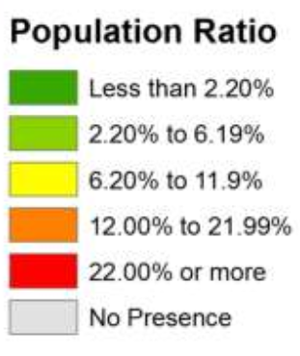[The following is a paid advertisement.]
We are pleased to announce an exciting and important milestone for ComEd’s transformation of the electrical system serving northern Illinois. We have submitted our plan to the Illinois Commerce Commission (ICC) for the installation of smart meters across our service territory. Here are the highlights:
• The deployment plan will occur over a 10-year period and introduce more than four million smart meters in all.
• ComEd will install approximately 130,000 smart meters in 2012 in the following communities: Berkeley, Brookfield, Cicero, Elmwood Park, Forest View, Franklin Park, Harwood Heights, La Grange Park, Lyons, Norridge, North Riverside, Northlake, River Grove, Riverside, Rosemont, Schiller Park, Stickney, Stone Park and Westchester. Installation will continue in areas served by the Maywood operating center, where most of the meters were installed for ComEd’s AMI Pilot Program.
• Beginning next year, we plan to install approximately 400,000 smart meters annually through completion of the program in 2021.
• Our plan was developed in consultation with Governor Quinn’s Smart Grid Advisory Council and we’ve met with numerous community groups and stakeholders to discuss the plan.
We are proud of the collaboration and coordination that went into this plan and we are excited about the benefits smart meters will bring, including fewer and shorter outages, an improved customer experience, more opportunities for customers to control their energy consumption and save money.
Comments Off  
|
Question of the day
Wednesday, May 2, 2012 - Posted by Rich Miller
* Gov. Pat Quinn has said he’ll keep the General Assembly in session throughout the summer if necessary if the gaping $2.7 billion hole in the state’s Medicaid budget isn’t resolved. He also says that Medicaid and pension fixes must both happen this spring.
* The Question: I know it’s only May 2nd, but do you think the General Assembly’s spring session will last into the summer? Take the poll and then explain your answer in comments, please.
30 Comments  
|
Today’s maps: Illinois churches
Wednesday, May 2, 2012 - Posted by Rich Miller
* OK, it’s a little fuzzy looking because I had to increase the size so you could see it, but this is from the decennial Association of Statisticians of American Religious Bodies survey of predominant religions by county. First up, mainline Protestants…

The color key…

The differences between north and south here are more than just apparent, they’re striking, although not exactly surprising.
* Roman Catholics…

The color key…

* Explanation of how the data was collected…
In most cases, the numbers are supplied by the headquarters of each denomination, though organizations count membership differently. In a few instances, such as the nondenominational and Muslim categories, scholars’ surveys were used. The geographical spread reflects where people worship, not where they live.
* Illinois stuff…
That calculation revealed that evangelicals affiliated with independent churches make up the second-largest religious group in Illinois. In fact, in 48 of the 50 states, independent evangelicals occupy a top-five spot. In the Chicago area, Illinois and nationwide, Roman Catholics rank as the largest religious group.
With 176 religious traditions, Illinois slipped from its top spot as the most religiously diverse state in 2000, falling to Pennsylvania with 184. […]
Nationwide, the Church of Jesus Christ of Latter-day Saints, or Mormons, reported the most growth of all religious traditions in the U.S., adding more than 1.9 million adherents. In Illinois and Cook and DuPage counties, that distinction belonged to Muslims, a piece of information that intrigued researcher Clifford Grammich, of Downers Grove, who collected Catholic data for the study. […]
The Assemblies of God, a Pentecostal denomination, added 22,854 adherents — more growth than any other Christian tradition in the state, including Mormons.
The study shows that Catholics, though still the largest denomination in the state and the nation, declined about 5 percent nationwide as well as in Illinois and the Chicago area. Researchers warned, however, that numbers from previous studies were not wholly comparable.
Discuss.
15 Comments  
|
Bloomberg’s fuzzy math
Wednesday, May 2, 2012 - Posted by Rich Miller
* A Bloomberg headline from earlier this week…
Illinois Faces 25% Cost Increase to Borrow $1.8 Billion
The explanation…
The tax-exempt deal for the state, rated lowest by Moody’s Investors Service, includes a 10-year segment that underwriter Jefferies & Co. plans to offer to investors at 1.85 percentage points above benchmark AAA securities, according to a person familiar with the sale.
Illinois’s last general-obligation sale was on March 13 for $575 million, with 10-year securities priced to yield 1.51 percentage points above benchmark tax-exempts, according to data compiled by Bloomberg. That’s 0.34 percentage points below tomorrow’s tentative pricing plan, or a difference of 22.5 percent.
Well, that’s just silly. Borrowing costs would not have risen 25 percent. What was projected to increase 22.5 percent was the points above benchmark tax exempts that were paid in March. That’s ridiculous math and in no way justifies the headline or the rest of the breathless story, which was obviously designed to create maximum controversy ahead of the sale.
* And, no surprise, it turns out that when the bonds were actually sold they were priced to yield less than what Bloomberg had predicted. From the Wall St. Journal..
Ten-year bonds were priced to yield 3.62%, or 1.75 percentage points over a widely used municipal-bond benchmark. Ahead of the sale, comparable existing debt issued by Illinois was trading at a premium of 1.68 percentage points.
* But even though the state had $5 billion in orders for $1.8 billion of bonds, the WSJ still felt the need to trot out a lone bond vigilante…
Justin Land, a portfolio manager at Wasmer, Schroeder Co., said his firm owned some Illinois debt maturing within five years, but it was passing on this deal. Illinois “needs to get farther down the road toward fiscal responsibility before we are going to become big buyers again,” he said.
Bonded indebtedness gets paid first. Every state employee would miss out on their paychecks before bond payments were skipped. Mr. Land is right that we have a long way to go before we’re fiscally responsible, but anybody who thinks that Illinois will skip a bond payment is just downright crazy.
13 Comments  
|
“Oscar Mike”
Wednesday, May 2, 2012 - Posted by Rich Miller
* The State Journal-Register pleaded today with four area Republican legislators who oppose the governor’s pension and Medicaid fixes, but won’t come up with alternative ideas of their own…
But at this point — with the session set to end in four weeks — putting up opposition without offering alternatives is not an option. At least, it’s not an option if you want to be part of averting the greatest financial disaster in the state’s history. […]
Come on, guys. If all you’re willing to provide at this point is opposition, you’re relegating yourselves to the rearmost back benches of your chambers. This is the biggest game of your political careers. Are you really prepared to sit it out?
I totally agree.
And I’d say that very same thing to every member of the General Assembly. Usually, legislators prefer to avoid kicking up any dust. But as I’ve said before, this could be the most important legislative session of my lifetime.
Easy solutions just don’t exist any longer, so stop hoping that magic faeries will flutter down from the skies and make everything all better. They don’t exist. You wanted this job, so do it, already.
* Related and a roundup…
* More local lawmakers sound off on Quinn’s Medicaid, pension plans: McCann said he believes negotiations between the executive branch and its employees can work through the state’s pension problems if everyone is doing so in good faith. “If we are going to change the system in any way, shape or form, one thing we must do is make sure that it’s fair to everyone in the system,” McCann said. “It has to affect everyone equally. One group cannot get a sweetheart deal while another group doesn’t.” McCann said he has heard from his constituents, a number of whom are state workers, who have said that they believe they are working for an administration that doesn’t take agreements seriously. “I think we need to honor our obligations and negotiate with our employees in good faith,” McCann said.
* Editorial: Illinois’ ‘rendezvous wiith reality’ still a ways off: Mr. Quinn gets credit for an imperfect but politically courageous proposal. Lawmakers must swallow hard, refine the proposal on the revenue side and pass it.
* House Republicans protest Madigan rule: If I could speculate for a moment: Part of what seems to be going on is two of the House GOP’s new floor leaders – Bost and Rep. Dennis Reboletti, R-Elmhurst – are trying to fire up a caucus that has otherwise been in kind of a funk.
* Illinois Suspends Illinois Suspends Insurance Exchange Setup
* Zorn: Is Chicago really getting cheated?’ and other follow-up questions on teacher pensions
* Illinois Schools spent $48 million on taxi cabs
* Editorial: University of Illinois finance, judgment prompts questions
32 Comments  
|
Cullerton advances legislative scholarship ban
Wednesday, May 2, 2012 - Posted by Rich Miller
* The House approved a bill in March to abolish the so-called General Assembly scholarship program by a vote of 79-29. The bill has been sitting in a Senate subcommittee ever since, and the chairperson of that subcommittee, Sen. Kim Lightford, is a major GA scholarship advocate…
“I think it is a valuable resource that we are dismantling,” Lightford said. “I just believe we’re responding to media pressure.”
* It looked for a time like we were in for the same pattern: GA scholarship bill passes House, Senate kills it.
But Senate President John Cullerton took over the sponsorship of the bill after being beaten up badly by editorial boards far and wide. He also tacked on an amendment which mandates that all tuition waivers, valued at $415 million a year, be studied by a new Tuition and Fee Waiver Task Force, with a report due back by April 15, 2013.
The subcommittee moved the bill to the full committee on a 2-0-1 vote, with Lightford abstaining. The bill now appears headed for passage. And as long as there are no shenanigans in the House, once that chamber concurs with the amendment it’ll head to the governor’s desk before too long.
The legislative scholarship program has done a lot of good over the years, but too many of those scholarships were passed out as blatant political favors. It was time to end it. Past time, really. But, hey, sometimes things take a little time.
* From a Cullerton press release…
While Cullerton has long held that reforming the legislative scholarship program was possible, it has become clear that the majority of the General Assembly supports ending rather than reforming the program.
“This program has become a major distraction from what should be the focus the session – the state budget, Medicaid and pension reform, said President Cullerton. “It’s time to put it behind us so that we can turn our attention to larger issues that must be addressed this year.”
This step follows Cullerton’s past efforts to reform the General Assembly scholarship program by targeting specific abuses revealed by investigations and media reports. Reforms included prohibiting awards to family members of political contributors, blocking waivers to students outside of a member’s legislative district, and tightening the requirements for applicants.
As part of the effort to reform the system, Cullerton has also been a proponent of reviewing state requirements for all tuition waivers. Given the fact that the General Assembly scholarship program makes up only 3.25 percent of the total value of all state tuition waivers, Cullerton believes there may be a need for more scrutiny related to cost and requirements associated with the universe of waivers. The bill calls for a task force to review all waivers and report findings on or before April 15, 2013.
The bill abolishes the 103 year old General Assembly scholarship program by striking the program from state statute this year.
Discuss.
9 Comments  
|
Nekritz tries again
Wednesday, May 2, 2012 - Posted by Rich Miller
* Rep. Elaine Nekritz has revamped her bill to delete Illinois’ felony penalties for audio recording a police officer in the line of duty…
SB1808 is nearly identical to HB3944 except for one key aspect. The new bill requires state’s attorneys to consider charges if a person alters an audio recording of a law enforcement official in order to make it look like he or she is guilty of wrongdoing.
That could result in a charge of obstruction of justice or disorderly conduct , said Melinda Bentley, assistant director of legislative affairs for the Illinois State Bar Association.
Nekritz said the provision was added to address the concerns of law enforcement, but conceded she does not expect those groups to change their position. […]
At least two law enforcement groups, the Illinois State Police and the Illinois Association of Chiefs of Police, have said they oppose SB1808.
The new provision about penalties for altering recordings is a step in the right direction, said Laimutis Nargelenas, a lobbyist for IACP, but he said the bill is still unfair to law enforcement. He reiterated his support for one-party consent, in which only one person in a conversation would have to consent before being recorded. Nekritz opposes that idea.
One-party consent? So, if I’m ever (God forbid) recording, from a safe distance, a dastardly criminal shooting at a cop I’d have to first obtain permission from one of them? I suppose that’d be easier than following current law and getting permission from both, but, seriously, what the heck?
The natural reaction is to ask what they’re so afraid of. But I’m pretty sure it’s just the usual “This is our turf, so don’t mess with us” stuff we always see in Springfield from just about everybody.
* From the Illinois Press Association…
“There are already nine exemptions to the Eavesdropping Act that allow officers to record citizens without a warrant,” said Josh Sharp, government relations director of the Illinois Press Association, which supports the bill. “The score today is Police — 9, Citizens — 0.” […]
Stephen Franklin, president of the Chicago Headline Club, a chapter of the Society of Professional Journalists, added, “Any effort that decriminalizes and removes a threat to journalists doing legitimate work is a benefit to all journalists in Illinois.” He said his group “has long opposed this [current] law, which is unique to Illinois and unhelpful in the gathering of information.”
Sharp noted that the current law hinders reporters from doing their jobs but also makes it impossible to use citizen-supplied recordings of suspected police abuse on their websites.
“You can have the recording in your hands and see what’s going on right in front of you, but you can’t share that with your audience? In the most free country on Earth? That’s hard to believe, but that’s the law in Illinois today.”
19 Comments  
|
Prisons chief alleges fraud
Wednesday, May 2, 2012 - Posted by Rich Miller
* It’s hard to argue with the guy…
The head of the Illinois prison system told a legislative subcommittee that he believes millions of dollars paid out in workers’ compensation claims to Menard guards who claimed injury from turning keys involved “fraud.”
Tony Godinez, director of the Illinois Department of Corrections, alleged fraud in response to a question from Rep. Dwight Kay, R-Glen Carbon, during an April 18 session of the Appropriations-Public Safety Committee.
“I am not surprised nor am I taken aback too often in this job, but that was one time I was,” said Kay.
That was Kay’s reaction when Godinez, drawing on his long experience working in the state’s prison system, told the committee, “I think there’s fraud.” This was in reference to more than $10 million paid to guards and Menard Correctional Center employees for repetitive trauma injuries, usually carpal tunnel syndrome of the wrist or cubital tunnel syndrome of the elbow. […]
“I think there’s fraud. I’m sorry to say that but I’ve been working in this business a long time and was (warden) at Stateville for 12 years, some 12 very hard years, and I never saw claims like I’ve seen since I’ve been back,” Godinez said.
In answer to another question from Kay as to why the maximum security Menard prison, and to a lesser extent the medium security Pinckneyville Correctional Center, would be the only two prisons to have numerous repetitive trauma claims, Godinez said, “In my professional opinion, on a personal side, if you’re running a maximum security facility and your claim is using the keys too much, you’re not using them much in a maximum security facility. They’re not coming out a lot. So, I don’t understand why (Menard) as opposed to other facilities where the inmates in minimum and medium are coming out more and the keys are turned more.”
* Part of the problem here is that state agencies no longer have to pay workers’ comp claims. CMS now does that. So the agencies, like Corrections, have no incentive to either stop the fraud (since the cost is coming out of somebody else’s pocket) or fix the problem that’s causing the injuries (since that would cost the agency money and not fixing it would be somebody else’s problem).
Attorney General Lisa Madigan explained this situation in a recent letter to legislative leaders…
Prior to the Blagojevich Administration, some of the largest State agencies – IDOT, IDOC, DHS and ISP – each administered their own workers’ compensation claims, using their own funds. As a result, those agencies had a direct financial interest in improving the workplace to avoid or minimize workers’ compensation claims, defending against workers’ compensation claims and ensuring that injured workers could return to work as soon as possible to reduce the cost of TDD [Temporary Total Disability] payments.
Under the consolidated system for workers’ compensation claims, however, the employing agencies do not experience any impact to their budgets when their employees file claims or remain off of work and on TTD for an extended period of time, providing those agencies with no financial incentive to determine the cause of the increase in claims and take steps to eliminate it. The agencies also have little incentive to accommodate employees whenever possible (including with light duty work) to allow them to return to work quickly.
* Madigan also related this workers’ comp horror story from the private sector…
In 2009, the Second District Appellate Court reinstated benefits to an employee who was injured when he threw himself up against a vending machine in an attempt to dislodge a bag of Fritos that had become stuck after a co-worker attempted to purchase them. Circuit City Stores, Inc. v. IIC, 391 Ill. App. 3d 913 (2d Dist. 2009). The IWCC had awarded benefits to the employee by finding that the personal comfort doctrine applied and that because the employee’s use of physical force to shake the machine to dislodge a bag of chips was neither unusual nor outrageous, the employer was liable for workers’ compensation benefits.2 The Circuit Court reversed, finding that the personal comfort doctrine did not apply. The Appellate Court then reversed and reinstated the benefits.
Some doofus flings himself at a vending machine and that’s covered under workers’ comp? How the heck is that possible? From Madigan…
While acknowledging that the personal comfort doctrine did not apply, the Appellate Court found the claim was nevertheless compensable under the “Good Samaritan” doctrine. The Appellate Court noted that prior cases applying the Good Samaritan doctrine involved an employee providing aide to someone in urgent need (such as rescuing someone who fell into a lake, protecting a young child from physical harm or providing transportation to a stranded motorist and her children). The Appellate Court, however, extended the doctrine to cover an injured worker’s attempt to rescue a co-worker’s stranded bag of chips because the Court found that it was reasonably foreseeable to the employer that this may occur. In addressing the “arising out of’” employment analysis, the Appellate Court concluded that a reasonable trier of fact could find that the “injury originated in a risk incidental to [the employee’s] employment” because (1) the employer provided the vending machine for the convenience of its employees, (2) the machine was defective and (3) the defect “creat[ed] a need for action to dislodge the bag of Fritos.” Circuit City Stores, Inc. 391 Ill. App. 3d at 990-91.
The Illinois Supreme Court has made it clear that Illinois employers are not liable for accidents or injuries solely because they occur at work. The IWCC and the lower courts, however, have increasingly applied an expansive approach to determining whether an accident or injury arose out of and in the course of employment. These decisions have created significant challenges for employers in defending claims on the issue of compensability.
Sheesh.
32 Comments  
|
|
Comments Off  
|
|
Comments Off  
|
|
 Support CapitolFax.com
Support CapitolFax.com
Visit our advertisers...
  ...............
...............
 ...............
...............
 ...............
...............
 ...............
...............
 ...............
...............
 ...............
...............
 ...............
...............


|
   
|
Hosted by MCS |
SUBSCRIBE to Capitol Fax |
Advertise Here |
Mobile Version |
Contact Rich Miller
|





















